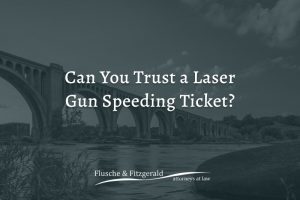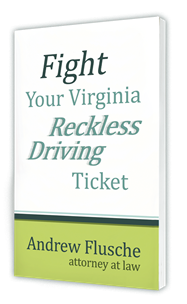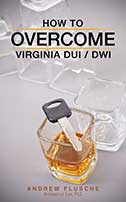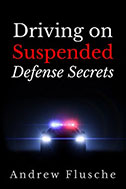Can You Trust a Laser Gun Speeding Ticket?
 Laser speed detectors, known as LIDAR guns, are a cornerstone of modern traffic enforcement. These devices measure vehicle speed, and the police typically use them to catch people who drive over the speed limit. Your relative speed plays a significant role in the penalties you may face for a speeding ticket, leading many individuals who have been issued speeding tickets to wonder about laser speed detector accuracy.
Laser speed detectors, known as LIDAR guns, are a cornerstone of modern traffic enforcement. These devices measure vehicle speed, and the police typically use them to catch people who drive over the speed limit. Your relative speed plays a significant role in the penalties you may face for a speeding ticket, leading many individuals who have been issued speeding tickets to wonder about laser speed detector accuracy.
At Flusche & Fitzgerald, we believe in empowering clients with knowledge. With years of experience defending Virginia drivers, our team tailors legal strategies to each case, combining technical knowledge about how police officers measure speed with legal acumen.
Contact us today at 540-318-5824 to discuss your case and learn how we can help you.
What Is a Police Laser Speed Gun?
A police laser speed gun, or LIDAR (Light Detection and Ranging) device, measures vehicle speed using pulses of infrared light. The device calculates speed by emitting a pulse of infrared light, counting how long it takes for the light to reflect, and calculating the rate of movement based on how much time has passed.
How Police Use Laser Guns
Police often use laser guns on highways, intersections, and other high-traffic zones. Officers using LIDAR devices must aim carefully to ensure an accurate reading, typically targeting reflective surfaces like license plates or headlights. Many police departments have specific policies about correctly calibrating laser guns and require officers to test them within a police laser gun range.
Issues with Laser Speed Detector Accuracy
Several factors can compromise laser speed detector accuracy, including:
- Adverse weather;
- Obstructions between the officer and the vehicle;
- Improper officer training; and
- Mechanical issues with the gun, including miscalibration.
In short, the specific conditions that occurred when the officer aimed the gun can affect the gun’s accuracy. Even a properly calibrated gun is not always accurate, leaving room for error.
Speeding Offenses in Virginia
Virginia law classifies speeding violations by how fast a driver travels compared to the posted speed limit. The penalties for these offenses primarily vary based on the difference between the driver’s recorded speed and the speed limit. Most speeding offenses result in fines, but many also add “points” to your driving record. Accumulating too many points can affect your driving privileges.
Virginia’s Points System
Virginia uses a points system, where each traffic violation adds points to the driver’s record. If you accumulate too many points, Virginia DMV may suspend your license. Driving despite a suspended license may lead to additional penalties, including extended suspensions, higher fines, or even jail time.
Generally, accumulating 18 or more points within 12 months results in a 90-day license suspension, and 24 or more points within 24 months results in the same suspension. Points affect your driving record for two years, but the underlying convictions that caused the points will stay on your record for three, five, or eleven years.
Speeding Offenses
Under Virginia law, you commit a general speeding offense when you exceed the posted speed limit by any amount. When you exceed the limit by up to five miles per hour, the statutory fine is $6 for each mile per hour above the speed limit you were driving. The fine may increase to $7 in school and highway work zones and $8 in residential districts.
Penalties increase based on how much you exceed the speed limit at the following speeds:
- Speeding between one and nine mph over the speed limit—three points;
- Speeding between 10 and 19 mph over the speed limit—four points; and
- Speeding 20 or more mph over the speed limit—six points.
You commit reckless driving by exceeding the speed limit by 20 mph or driving faster than 85 mph, regardless of the speed limit.
Additional offenses can become more severe based on your speed, too. For example, allegations that you were speeding when accused of the following offenses may result in higher fines or even potential jail time:
- Aggressive driving,
- Driving under the influence (DUI) or driving while intoxicated (DWI),
- Speeding in a construction zone,
- Passing a school bus with flashing lights,
- Driving with a suspended or revoked license,
- Failure to yield to emergency vehicles, and
- Vehicular manslaughter or homicide.
When accused of one of these crimes, a laser speed gun’s measurement might significantly increase or decrease the severity of the charges.
Can I Beat a Laser Speeding Ticket?
Contesting a speeding ticket often involves scrutinizing the laser speed detector’s accuracy, raising questions about:
- Improper calibration,
- Officer error, or
- Environmental conditions that affect the device’s reliability.
Andrew and Fitz Can Help
Laser speed detectors play a core role in traffic enforcement, but laser speed detector accuracy can be flawed. If you are considering challenging a recent speeding ticket, contact Flushe & Fitzgerald to explore your options. Andrew and Fitz bring a collaborative approach to every case, ensuring no detail is overlooked. Our commitment to client advocacy has earned us recognition as trusted defenders in Virginia traffic courts.
Resources:
Code of Virginia § 18.2-11, link.
Code of Virginia § 46.2-113, link.
Code of Virginia § 46.2-862, link.
Code of Virginia § 46.2-868, link.
Code of Virginia § 46.2-868.1, link.
Virginia Department of Motor Vehicles (DMV), The Points System, link.
Virginia Department of Motor Vehicles (DMV), Moving Violations and Point Assessments, link.
Virginia Department of Motor Vehicles (DMV), Virginia Driver’s Manual: Section 5: Penalties,
link.




